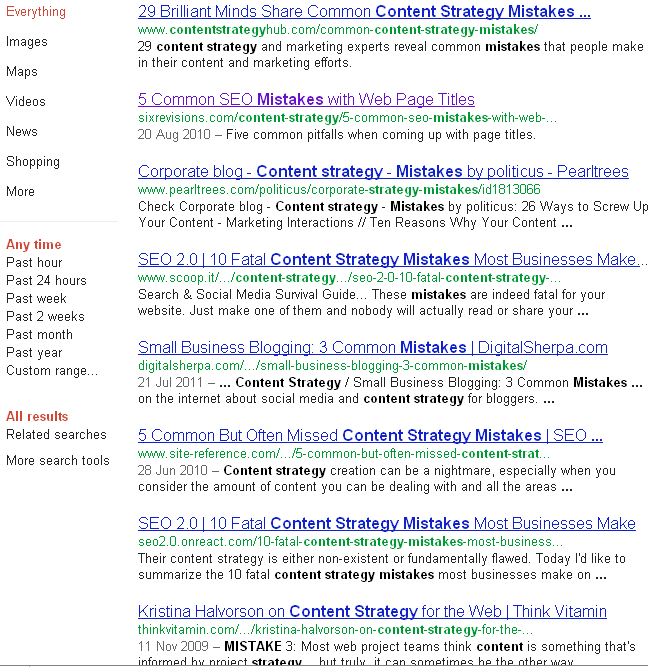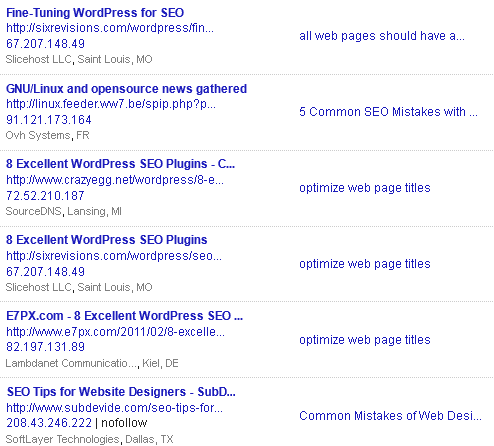
Google has more than 200 ranking signals or factors that determine the fate of websites on their search results.
One day I was trying to assess the impact of stolen and otherwise copied content on my rankings here on the SEO 2.0 blog.
I’ve found an anomaly in the Google results I want to share with you!
It appeared that category keywords in a website address or URL matter a lot when it comes top Google rankings.
How a Web Design Blog Outranked Others
A post from a popular Web design blog, indeed a blog I liked very much, Six Revisions outranked other far more relevant search results for the keyphrase [content strategy mistakes]:

Take note that the blog has been later acquired by a large digital marketing agency and fused with their corporate blog.
The article that ranked on #2 did not even deal with content strategy mistakes. Instead it covered SEO mistakes.
I asked myself: why does an offtopic Web design blog rank for content strategy above content marketing publications?
Then I wanted to know: How did it do it? I hoped to copy their SEO techniques!
What did Six Revisions do right then? Apparently it succeeded by a single keyword mention below the posting:

and most importantly a category named after part of the keyphrase in question: “content strategy”:
http://sixrevisions.com/content-strategy/5-common-seo-mistakes-with-web-page-titles/
So the most significant onpage ranking factor seems to be the category keywords in the URL.
The site has lots of backlinks, the post itself as well. So far so good but there is there a reason why this post should rank specifically for that keyphrase or is it?
No Inbound Links with Matching Anchor Text
There are no incoming links with the keyword combination in the anchor text as you see on the screen shot below:

Above: a list of the inbound link anchor texts. None of them contain the term “content strategy”
Still it outranked other pages that really deal with content strategy mistakes while itself the post does only cover SEO mistakes.
What do you think? Is this an exception from the rule? Are category keywords in the URL a significant ranking signal now?
Or does Google favor authority sites so much these days hat they need only slightly relevant content to outrank the competition that covers the topic at stake directly?
This Blog Got Penalized by Google
You may wonder why I rank so bad in this example. My blog had been “pandalized” a bit earlier during a minor Panda update with the number 2.5.2.
I have been removed from the top 10 for all two word keyphrases I have been ranking in the top 10 for years. You won’t find my blog for phrases like
- [seo blog]
- [image seo]
- [advanced seo]
- [url seo]
anymore. That’s one of the reasons why I don’t rank higher for [content strategy mistakes].
I mostly ranked for some very long long tail queries ever since.
Nonetheless I ranked in the top 10 for the term [content strategy mistakes] with my list of content strategy mistakes.
SEO Experts Weigh in
Also take note that an aggregator on a service called Scoop.it curated by a friend mine, Gabriella of Level 343 who cites my posts ranked higher than the post on SEO 2.0 itself.
I have asked on Twitter whether some SEO experts can confirm that keyword mentions in categories are an important ranking factor these days.
I know that the impact of keywords in URLs beyond the domains has been negligible over the recent years. Has Google changed this?
Two experts, Shark SEO and Mark Edmondson have weighed in that there might be other reasons but were surprised as well by this example. What do you think?
P.S.: I didn’t link out to any of the sites or pages involved here in order not to skew the results.








